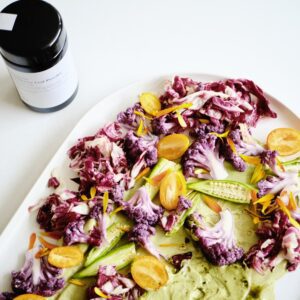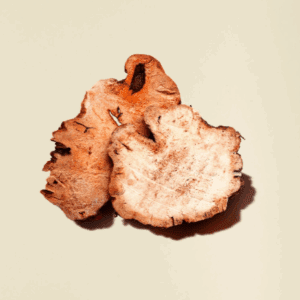
Coconut Yoghurt Cream with Mustard & Mulberry Leaf Powder
If you’re looking for a natural way to support blood

Kick-start, energise, rejuvenate
All carefully planned and prepared to help nourish, reset and rejuvenate the body and mind.

In the world of tonic herbs and medicinal mushrooms, there’s a class of natural compounds that consistently stands out for its profound impact on human health: beta-glucans.
Found in the cell walls of many functional fungi, including all of our medicinal mushrooms, beta-glucans are a a type of soluble fiber found in the cell walls of certain plants, fungi, bacteria, and yeast that help regulate the immune system, balance inflammation, and support everything from gut health to metabolic function.
While the ancient healing traditions of China and Japan have long revered mushrooms for their energetic and physical healing properties, modern science is now catching up, with beta-glucans being one of the compounds that make these mushrooms a superstar.
Beta-glucans are naturally occurring polysaccharides, or long chains of glucose molecules, found in the cell walls of fungi, yeasts, algae, and certain grains. But not all beta-glucans are created equal.
This priming doesn’t overstimulate the immune response (as synthetic immune boosters might), but instead enhances its intelligence, supporting a more modulated, resilient immune response.
Unlike vitamins or antioxidants that are absorbed into the bloodstream, beta-glucans mostly travel through the digestive tract. As they interact with gut-associated lymphoid tissue (GALT)—a key part of the immune system housed in the intestines—they:
In short, beta-glucans have a dual effect on immune function, which is why they’ve been studied for their roles in cancer therapies, infection prevention, allergies, autoimmune modulation, and more.
Medicinal mushrooms don’t simply “boost” immunity—they teach it how to regulate itself more wisely.
Beta-glucans act as soluble fibres that resist digestion in the upper GI tract, reaching the colon where they:
This makes beta-glucans especially supportive for people dealing with leaky gut, IBS, or chronic inflammation.
While we don’t make medical claims, it’s clear that beta-glucans hold an essential place in integrative, immune-informed wellness strategies.
At Shokuiku, we work with a diverse range of medicinal mushrooms, each selected for its unique energetic properties and bioactive compounds. Here’s a deeper look into some of the key mushrooms we use — and how their beta-glucan content supports the body:
Known as the “Mushroom of Immortality,” Reishi is revered for its immune-modulating, cardiovascular, and adaptogenic effects. Its 1,3 and 1,6-beta-glucans are particularly effective in enhancing natural killer (NK) cell activity and overall immune intelligence, while also supporting the parasympathetic nervous system.
Turkey Tail (Trametes versicolor)
A cornerstone of gut and immune health, Turkey Tail contains PSK and PSP—two highly researched protein-bound beta-glucans. These compounds are studied for their role in immune support, particularly in integrative oncology settings, and their ability to nourish the gut microbiome.
Valued for its ability to regulate blood sugar and support metabolic health, Maitake is rich in D-fraction beta-glucans. These polysaccharides help improve insulin sensitivity, enhance T-cell response, and balance immune function in a non-stimulating way.
Shiitake contains lentinan, a well-known beta-glucan with potent immune-enhancing and antiviral properties. This mushroom is traditionally used to strengthen Qi, support cardiovascular health, and nourish the blood.
Lion’s Mane (Hericium erinaceus)
Famous for its brain-boosting properties, Lion’s Mane offers both beta-glucans and unique compounds that stimulate nerve growth factor (NGF) production. It supports cognitive clarity, neuroprotection, and regeneration of nerve tissue—all while enhancing gut-immune communication.
Cordyceps (Cordyceps militaris/sinensis)
Cordyceps is prized for its ability to build physical endurance, support lung function, and increase ATP production (the primary source of cellular energy). While its beta-glucan content is moderate compared to others, it offers strong adaptogenic and rejuvenating effects, making it a favourite among those recovering from fatigue or burnout.
Agaricus blazei (Agaricus subrufescens)
This lesser-known but influential mushroom is exceptionally high in 1,3-beta-glucans. It’s been extensively studied for its immune-regulating effects, particularly in allergic responses and cancer support. It also shows promise in modulating inflammation and supporting a balanced Th1/Th2 immune response.
Used widely in Traditional Chinese Medicine, Poria is a mycelial fungus that supports digestion, fluid metabolism, and emotional balance (Shen). It contains beta-glucans that gently modulate the immune system and support spleen Qi, making it a valuable tonic for individuals with damp or weak digestion.
Often referred to as the “King of Medicinal Mushrooms,” Chaga is rich in antioxidants and possesses anti-inflammatory properties. Its beta-glucans work in conjunction with betulinic acid and melanin to support immune function, modulate inflammation, and promote skin and cellular health. It also supports the liver and is often used as a grounding, nourishing tonic.
Here’s how we recommend incorporating them:
Always look for:
At Shokuiku, we’re not just offering medicinal mushrooms—we’re offering a way of living more deeply connected to nature, your body, and your consciousness.
Our mushroom-based offerings are carefully selected for:
We honour mushrooms as living intelligence, not just as supplements. And beta-glucans are part of how that intelligence works through us—quietly, intelligently, adaptively.
In a world where immune systems are either overstimulated or depleted, these compounds offer gentle, intelligent support grounded in both ancient tradition and modern research.
| Mushroom | Key Actions | Notable Beta-Glucan Effects |
|---|---|---|
| Reishi | Immune, cardiovascular, anti-stress | 1,3 / 1,6-beta-glucans enhance NK cell activity |
| Turkey Tail | Gut, immune modulation, microbiome | Rich in PSK + PSP for clinical immune support |
| Maitake | Blood sugar, metabolic health | Improves insulin response and T-cell activity |
| Shiitake | Heart health, immune boosting | Contains lentinan, a well-studied immune-enhancing beta-glucan |
| Lion’s Mane | Cognitive support, nerve regeneration | Contains both beta-glucans and NGF-stimulating compounds for brain health |
| Cordyceps | Energy, endurance, lung health | Moderate beta-glucans; supports ATP production and oxygen uptake |
| Agaricus blazei | Immune modulation, anti-inflammatory | Extremely high in 1,3-beta-glucans; studied for anti-tumour and allergy-regulating potential |
| Poria cocos | Digestive and fluid balance, calming Shen | Contains beta-glucans and triterpenes; supports spleen function and gentle immune regulation |
| Chaga | Antioxidant, immune tonic, skin health | Rich in 1,3-beta-glucans and betulinic acid; modulates immunity and quenches inflammation |

If you’re looking for a natural way to support blood

Despite growing threats to our well-being, the human longing for

There are herbs and mushrooms that make waves in the
Copyright Shoku Iku © 2024 | All Rights Reserved.
The statements on this website have not been evaluated by the TGA or FDA. These products are not intended to diagnose, treat, cure or prevent any disease.
Sign up to receive your discount.